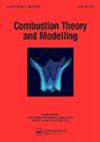Modelling of acetaldehyde and acetic acid combustion
IF 1.6
4区 工程技术
Q4 ENERGY & FUELS
引用次数: 0
Abstract
Despite the beneficial impact of biofuels on most regulated pollutants and carbon dioxide emissions, their combustion results in the generation of undesired pollutants, such as acetaldehyde and acetic acid. To better understand the chemistry of these species, detailed chemical kinetic models deriving from two alternative strategies for mechanism generation were developed and validated against available data. The first model represents a semi-lumped mechanism comprising 89 species and 366 reactions, whereas the latter is automatically generated to aggregate elemental steps based on a rate-based algorithm, and it contains 541 species and 27,334 reactions. Under the studied conditions, the two kinetic models fairly predicted ignition delay times and laminar burning velocity data of acetic acid and acetaldehyde. Few discrepancies were observed for ignition delay time at temperatures lower than 1300 K. However, the overall agreement between experimental measurements and numerical estimations allowed for the use of the two kinetic models to unravel the chemistry of the investigated species. Highlights Identification of key primary reactions for acetic acid and acetaldehyde Integration of an existing kinetic mechanism with selected reactions Development of a detailed kinetic mechanism through an automated algorithm Comparison of experimental and numerical data for overall reactivity Analysis of the chemistry of acetic acid and acetaldehyde乙醛和乙酸燃烧模拟
尽管生物燃料对大多数受管制的污染物和二氧化碳排放产生了有益的影响,但它们的燃烧会产生不需要的污染物,如乙醛和乙酸。为了更好地了解这些物种的化学性质,从两种机制生成的替代策略中推导出了详细的化学动力学模型,并根据现有数据进行了验证。第一个模型代表了一个半集总机制,包括89个物种和366个反应,而后者是基于基于速率的算法自动生成的,以聚合元素步骤,它包含541个物种和27334个反应。在所研究的条件下,两个动力学模型较好地预测了乙酸和乙醛的点火延迟时间和层流燃烧速度数据。在低于1300的温度下,几乎没有观察到点火延迟时间的差异 K.然而,实验测量和数值估计之间的总体一致性允许使用两个动力学模型来揭示所研究物种的化学性质。亮点乙酸和乙醛关键初级反应的识别现有动力学机制与选定反应的集成通过自动化算法开发详细的动力学机制总体反应性实验和数值数据的比较乙酸和乙醛化学分析
本文章由计算机程序翻译,如有差异,请以英文原文为准。
求助全文
约1分钟内获得全文
求助全文
来源期刊

Combustion Theory and Modelling
工程技术-工程:化工
CiteScore
3.00
自引率
7.70%
发文量
38
审稿时长
6 months
期刊介绍:
Combustion Theory and Modelling is a leading international journal devoted to the application of mathematical modelling, numerical simulation and experimental techniques to the study of combustion. Articles can cover a wide range of topics, such as: premixed laminar flames, laminar diffusion flames, turbulent combustion, fires, chemical kinetics, pollutant formation, microgravity, materials synthesis, chemical vapour deposition, catalysis, droplet and spray combustion, detonation dynamics, thermal explosions, ignition, energetic materials and propellants, burners and engine combustion. A diverse spectrum of mathematical methods may also be used, including large scale numerical simulation, hybrid computational schemes, front tracking, adaptive mesh refinement, optimized parallel computation, asymptotic methods and singular perturbation techniques, bifurcation theory, optimization methods, dynamical systems theory, cellular automata and discrete methods and probabilistic and statistical methods. Experimental studies that employ intrusive or nonintrusive diagnostics and are published in the Journal should be closely related to theoretical issues, by highlighting fundamental theoretical questions or by providing a sound basis for comparison with theory.
 求助内容:
求助内容: 应助结果提醒方式:
应助结果提醒方式:


